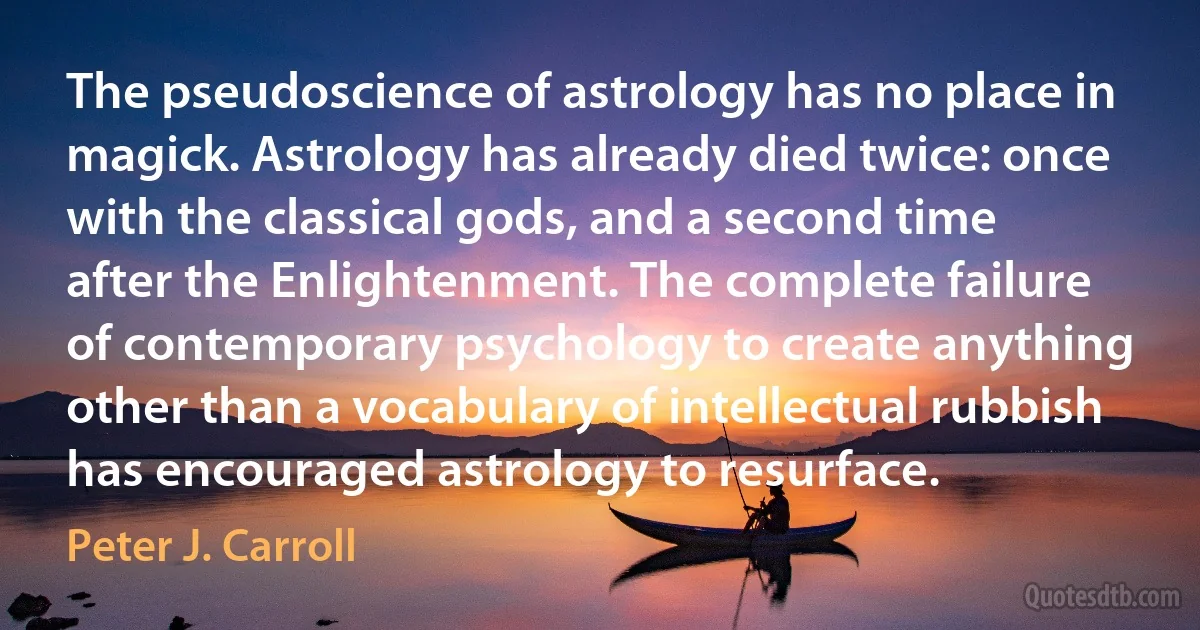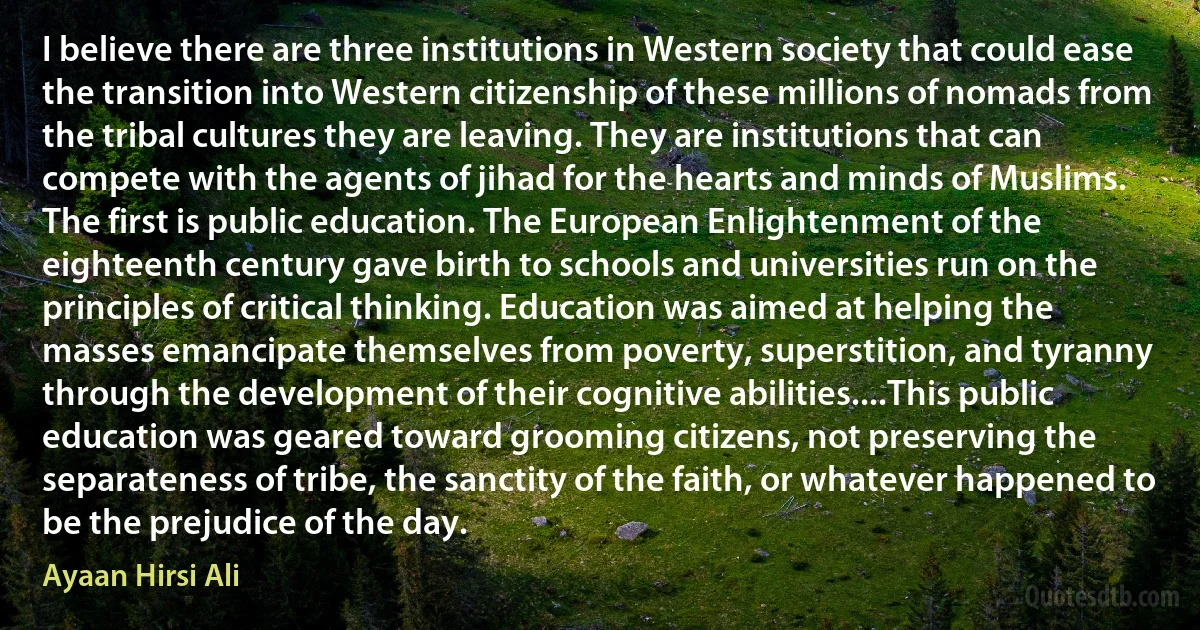Enlightenment Quotes - page 15
So in summary you can see that in my experience there has been no sudden blast of enlightenment, no blinding light such as Paul of Tarsus experienced on the Damascus road. Rather I have experienced a series of smaller steps, some taken with no hesitation, others with some fear and trembling.

Howard Ray Carey
The approach presented in my book The Idea of Justice shares the general Enlightenment interest in relying on reasoning in general and public reasoning in particular, and in this respect there is something very substantially in common between the two alternative disciplines of reasoning that emerged from the intellectual climate of the Enlightenment period, that is, between the Hobbesian and Kantian reasoning (with its successors today, such as the Rawlsian social contract approach) and the reasoning of Smith and Condorcet (with its successors today, such as normative social choice theory).

Amartya Sen
It must never be forgotten, however, that the Bill of Rights was the child of the Enlightenment. Back of the guarantee of free speech lay faith in the power of an appeal to reason by all the peaceful means for gaining access to the mind. It was in order to avert force and explosions due to restrictions upon rational modes of communication that the guarantee of free speech was given a generous scope. But utterance in a context of violence can lose its significance as an appeal to reason and become part of an instrument of force. Such utterance was not meant to be sheltered by the Constitution.

Felix Frankfurter
As astronomy and physics inspired the Enlightenment, so biology inspired Modernism. ...This new view led to a reexamination in art of the biological nature of human existence, as evident in Édouard Manet's Déjeuner sur l'Herbe... Manet's painting... reveals a theme... the complex relationship between the sexes and between fantasy and reality. ...also startlingly modern because of its style. Several decades before Cézanne began to collapse three dimension into two, Manet here had already flattened the viewer's sense of perspective...

Eric Kandel
The Enlightenment worldview held by Du Bois is ultimately inadequate, and, in many ways, antiquated, for our time. The tragic plight and absurd predicament of Africans here and abroad requires a more profound interpretation of the human condition - one that goes beyond the false dichotomies of expert knowledge vs. mass ignorance, individual autonomy vs. dogmatic authority, and self-mastery vs. intolerant tradition.

W. E. B. Du Bois
The Art of Peace begins with you. Work on yourself and your appointed task in the Art of Peace. Everyone has a spirit that can be refined, a body that can be trained in some manner, a suitable path to follow. You are here to realize your inner divinity and manifest your innate enlightenment. Foster peace in your own life and then apply the Art to all than you encounter.

Morihei Ueshiba
We are dissipating superstition, ignorance and fear. We are forging courage, will and knowledge.
Every striving toward enlightenment is welcome. Every prejudice, caused by ignorance, is exposed.
Thou who dost toil, are not alive in thy consciousness the roots of cooperation and community?
If this flame has already illumined thy brain, adopt the signs of the Teaching of Our mountains.
Thou who dost labor, do not become wearied puzzling over certain expressions. Every line is the highest measure of simplicity.
Greeting to workers and seekers!

Nicholas Roerich
Weirdly, the world suddenly feels bipolar. All over again the west confronts an irrationalist, agonistic, theocratic/ideocratic system which is essentially and unappeasably opposed to its existence. The old enemy was a superpower; the new enemy isn't even a state. In the end, the USSR was broken by its own contradictions and abnormalities, forced to realise, in Martin Malia's words, that "there is no such thing as socialism, and the Soviet Union built it". Then, too, socialism was a modernist, indeed a futurist, experiment, whereas militant fundamentalism is convulsed in a late-medieval phase of its evolution. We would have to sit through a renaissance and a reformation, and then await an enlightenment. And we're not going to do that.

Martin Amis
I'm a father. And no matter how much I try to convince myself towards the course of 'enlightenment' I know damn well that, put to the test, I'm what people would call a reactionary. I know it. I try and rationalize it but it's no good. I come to the same conclusion all the time. My children stand a chance of being hurt in the forseeable future by what's called permissiveness.

Neil Kinnock
In every wise struggle for human betterment one of the main objects, and often the only object, has been to achieve in large measure equality of opportunity. In the struggle for this great end, nations rise from barbarism to civilization, and through it people press forward from one stage of enlightenment to the next. One of the chief factors in progress is the destruction of special privilege. The essence of any struggle for healthy liberty has always been, and must always be, to take from some one man or class of men the right to enjoy power, or wealth, or position, or immunity, which has not been earned by service to his or their fellows. That is what you fought for in the Civil War, and that is what we strive for now.

Theodore Roosevelt
It is not strictly accurate to call the ‘enlightenment' a middle class ideology, though there were many enlighteners-and politically they were the decisive ones-who assumed as a matter of course that the free society would be a capitalist society. In theory its object was to set all human beings free. All progressive, rationalist and humanist ideologies are implicit in it, and indeed came out of it. Yet in practice the leaders of the emancipation for which the enlightenment called were likely to be the middle ranks of society, the new, rational men of ability and merit rather than birth, and the social order which would emerge from their activities would be a ‘bourgeois' and capitalist one.

Eric Hobsbawm
...But no matter how enamoured one may be with Postmodernist instability of meanings and signification slippage, absolutely nothing can make spinozisme as employed in Diderot's Promenade and the Encyclopédie, or in High Enlightenment literature, compatible with Revelation, divine providence, religious authority, theism, mysticism, fideism, eclecticism, moral relativism, Aristotelian substances, Platonic ideals, Prisca theologia (natural religion), Cartesian dualism, Lockean dualism based on supra rationem, double truth, fixity of species, Epicurean swerves, La Mettrie's materialism, or skepticism. ‘Spinozists' a term already in very wide use, in Britain, Germany, France, and Italy, as well as Holland well before 1700, and ‘spinozisme' as used in eighteenth-century France, can never mean, or ever be blended with, any of these trends. It may not always be a rigorous philosophical-theological category.

Baruch Spinoza
[In the 18th century] Whether one reads the underground texts or those of the great Enlightenment authors, one has the impression that Spinozism was everywhere; but at the same time, it can be said, strictly speaking, there were no Spinozists (except as convenient phantoms for apologists); there were only thinkers who make use of Spinoza. Naturally, they could do so with more or less creativity, style, and depth.

Baruch Spinoza
Spinoza's views on God, religion and society have lost none of their relevance. At a time when Americans seem willing to bargain away their freedoms for security, when politicians talk of banning people of a certain faith from our shores, and when religious zealotry exercises greater influence on matters of law and public policy, Spinoza's philosophy – especially his defence of democracy, liberty, secularity and toleration – has never been more timely. In his distress over the deteriorating political situation in the Dutch Republic, and despite the personal danger he faced, Spinoza did not hesitate to boldly defend the radical Enlightenment values that he, along with many of his compatriots, held dear. In Spinoza we can find inspiration for resistance to oppressive authority and a role model for intellectual opposition to those who, through the encouragement of irrational beliefs and the maintenance of ignorance, try to get citizens to act contrary to their own best interests.

Baruch Spinoza
...He [Lessing] even felt that the highest compliment he could confer on his friend Moses Mendelssohn, whom he greatly admired, was to call him a "second Spinoza." Mendelssohn, one of the fathers of the modern German enlightenment, was an adherent of Leibnitz. As such he could not be a follower of Spinoza, although he, too, admired his personality. Furthermore, he failed to understand Spinoza, for he could never free himself from Bayle's presentation of Spinoza's doctrine. Nevertheless, this very Mendelssohn, by his controversy with Jacobi about Lessing's relationship to Spinoza, was instrumental in making the latter a potent force in German letters. It is interesting to observe that even those thinkers who dedicated their lives to the cause of anti-Spinozism paid the highest tribute to his personality.

Baruch Spinoza
Analysis as an instrument of enlightenment and civilization is good, in so far as it shatters absurd convictions, acts as a solvent upon natural prejudices, and undermines authority; good, in other words, in that it sets free, refines, humanizes, makes slaves ripe for freedom. But it is bad, very bad, in so far as it stands in the way of action, cannot shape the vital forces, maims life at its roots. Analysis can be a very unappetizing affair, as much so as death.

Thomas Mann
I have said that nothing factual that I write or say will be as truthful as my fiction. The life, the opinions, are not the work, for it is in the tension between standing apart and being involved that the imagination transforms both. Let me give some minimal account of myself. I am what I suppose would be called a natural writer. I did not make any decision to become one. I did not, at the beginning, expect to earn a living by being read. I wrote as a child out of the joy of apprehending life through my senses - the look and scent and feel of things; and soon out of the emotions that puzzled me or raged within me and which took form, found some enlightenment, solace and delight, shaped in the written word.

Nadine Gordimer
I often tell people to make no mistake about it-enlightenment is a destructive process. It has nothing to do with becoming better or being more or less happy. Enlightenment is the crumbling away of untruth. It's seeing through the facade of pretense. It's the complete eradication of everything we imagined to be true.

Adyashanti
Positive philosophy made its counter-attack against critical rationalism on two fronts. Comte fought against the French form of negative philosophy, against the heritage of Descartes and the Enlightenment. In Germany, the struggle was directed against Hegel's system. Schelling received an express commission from Frederick William IV ‘to destroy the dragon seed' of Hegelianism, while Stahl, another anti-Hegelian, became the philosophical spokesman of the Prussian monarchy in 1840.

Herbert Marcuse



